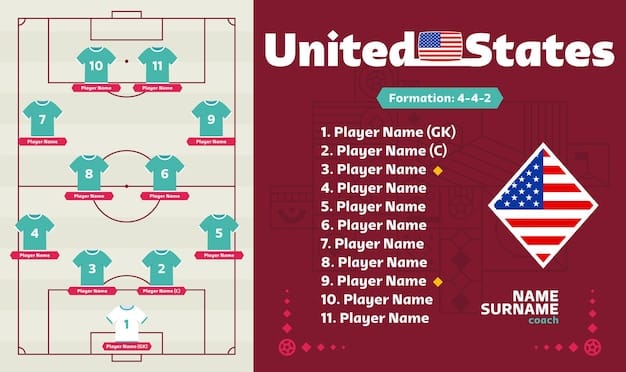FIFA’s Governance Reforms: US Soccer’s Path to Best Practices

FIFA’s recent governance reforms present a critical opportunity for the US Soccer Federation to enhance its operational integrity and align with global best practices, fostering greater transparency, accountability, and inclusivity in its foundational structures.
In the evolving landscape of global football, understanding and adopting advanced governance frameworks is paramount for national federations. The recent shifts in FIFA’s Governance Reforms: How the US Soccer Federation Can Align with the Latest Best Practices offer a crucial roadmap for enhancing transparency, accountability, and overall operational efficiency. This article delves into these transformative reforms and explores how US Soccer can proactively integrate these principles to strengthen its foundation and foster a more robust and equitable future for the sport within the United States.
Understanding FIFA’s Governance Reforms: A New Era of Accountability
FIFA, the global governing body for football, has undergone significant governance reforms following periods of intense scrutiny and scandal. These reforms, initiated to restore trust and ensure long-term stability, represent a paradigm shift towards greater transparency, accountability, and inclusivity. For national federations like the US Soccer Federation, these changes are not merely recommendations but essential guidelines for modern sports administration.
The core of these reforms lies in a commitment to ethical conduct and robust decision-making processes. They aim to prevent conflicts of interest, promote diversity, and ensure that financial operations are conducted with utmost integrity. This commitment extends beyond the FIFA Council, cascading down to member associations, encouraging them to adopt similar stringent standards.
Key Pillars of Reform
The foundational elements of FIFA’s governance reforms are multifaceted, addressing various areas that historically posed challenges. These pillars collectively form a framework designed to build a more resilient and credible organization.
- Enhanced Transparency: Requiring public disclosure of financial information, salaries of top officials, and detailed meeting minutes to foster openness.
- Strict Ethical Codes: Implementing revised and stricter ethical codes of conduct for all officials and employees, with independent oversight.
- Independent Oversight Bodies: Establishing or strengthening independent committees, such as the Ethics Committee and Audit and Compliance Committee, with real power to investigate and enforce.
These measures are designed to ensure that decisions are made in the best interest of the sport, rather than individual gain. The emphasis on independent oversight is particularly crucial, as it provides a necessary check on power and helps maintain impartiality.
Impact on Member Associations
The implications of FIFA’s reforms for member associations are profound. While FIFA itself has implemented these changes internally, it simultaneously encourages and, in some cases, mandates its member federations to align their own governance structures accordingly. This alignment is not just about compliance; it’s about adopting best practices that can materially improve the operations, reputation, and sustainability of each federation.
For US Soccer, understanding these reforms is the first step. The next is to critically evaluate existing structures and identify areas where alignment can lead to significant improvements. This could involve revisiting aspects of their constitution, bylaws, and internal policies to ensure they reflect the spirit and letter of FIFA’s new governance standards. The ultimate goal is to foster a culture of good governance that permeates all levels of the organization, from grassroots development to elite competition.
Assessing US Soccer’s Current Governance Framework
To effectively align with FIFA’s latest best practices, the US Soccer Federation must first conduct a thorough and honest assessment of its existing governance framework. This involves scrutinizing its organizational structure, decision-making processes, financial oversight mechanisms, and the composition of its leadership bodies. A detailed understanding of current strengths and weaknesses is crucial for formulating a strategic roadmap for reform.
US Soccer, like many federations, operates within a complex ecosystem of professional leagues, youth soccer organizations, and various stakeholders. Its governance must reflect these diverse interests while maintaining a clear and consistent vision for the sport’s development at all levels. Historically, concerns have been raised regarding representation, inclusion, and the responsiveness of its leadership to the broader soccer community.
Strengths and Areas for Improvement
Examining US Soccer’s current framework reveals both commendable aspects and areas ripe for enhancement. On the positive side, US Soccer has a dedicated professional staff and a history of significant achievements on the international stage. Initiatives like its coaching education programs and efforts in youth development contribute positively to the sport’s growth.
However, areas for improvement often center around stakeholder representation, pathways for diverse voices to enter leadership, and the transparency of certain operational decisions. Critiques often point to the need for a more inclusive electoral process for board positions and clearer guidelines for ethical conduct across all constituent parts of the federation.
- Representation: Ensuring that the Board of Directors and other committees truly reflect the diversity of the US soccer landscape (e.g., professional vs. amateur, male vs. female, different ethnic backgrounds).
- Transparency of Operations: Increasing public access to board meeting minutes, financial audits, and conflict-of-interest policies.
- Ethical Frameworks: Reviewing and strengthening existing ethics codes, potentially establishing independent ethics enforcement mechanisms, similar to FIFA’s.
Addressing these areas is vital not just for compliance with FIFA, but for building a stronger, more united, and more legitimate organization in the eyes of its members and the public.
The assessment should not be a one-time event but an ongoing process of self-evaluation and adaptation. It requires a willingness to engage with constructive criticism and to implement changes that may challenge existing conventions. By proactively identifying and addressing these points, US Soccer can demonstrate a commitment to modern governance and set a benchmark for other national federations.
Strategies for Alignment: Translating Reforms into Action
Translating FIFA’s governance reforms into actionable strategies for the US Soccer Federation requires a deliberate and comprehensive approach. It’s about moving beyond mere compliance to genuinely embed the principles of good governance into the organization’s DNA. This involves revisiting foundational documents, reforming electoral processes, enhancing financial oversight, and fostering a culture of integrity.
One primary strategy should focus on revising the US Soccer bylaws and constitution. These foundational documents dictate how the organization operates, who holds power, and how decisions are made. Aligning them with FIFA’s best practices means ensuring they promote inclusive representation, define clear roles and responsibilities, and establish independent checks and balances.
Reforming Electoral Processes and Board Composition
A critical component of governance reform involves the electoral process for leadership positions and the overall composition of the Board of Directors. FIFA’s push for diversity and independence means federations should strive for boards that are not only representative but also include independent members with relevant expertise who can offer objective perspectives.
- Independent Directors: Appointing a significant number of independent directors with no prior vested interests within US Soccer structures, bringing diverse professional expertise.
- Diversity Requirements: Implementing specific quotas or targets for gender and ethnic diversity on the board, ensuring representation of the broader soccer community.
- Term Limits: Establishing clear term limits for board members and presidents to prevent entrenchment and encourage fresh perspectives.
These changes can help mitigate potential conflicts of interest and ensure that leadership decisions are broad-based and not driven by narrow interests. It also opens pathways for new talent and perspectives to contribute to the sport’s strategic direction.

Enhancing Financial Transparency and Oversight
Financial integrity is a cornerstone of modern governance. US Soccer can significantly enhance its alignment with FIFA’s reforms by fortifying its financial transparency and oversight mechanisms. This goes beyond annual audits and includes proactive measures to disclose financial dealings, procurement processes, and compensation structures.
Specific actions could include publishing detailed financial reports, including executive compensation, on its official website. Implementing a robust whistleblower policy with independent channels for reporting financial misconduct is also crucial. Furthermore, establishing an independent audit and compliance committee with external experts can provide an additional layer of scrutiny and assurance regarding financial probity.
By adopting these strategies, US Soccer can not only comply with FIFA’s evolving standards but also build greater trust among its stakeholders, from players and coaches to fans and sponsors. It’s an investment in the long-term health and credibility of American soccer, ensuring its continued growth on a foundation of integrity and best practice.
Ethical Frameworks: Upholding Integrity and Preventing Conflicts
The bedrock of effective governance lies in robust ethical frameworks designed to uphold integrity, prevent conflicts of interest, and ensure fair play beyond the pitch. FIFA’s governance reforms place a strong emphasis on establishing comprehensive ethical codes and independent enforcement mechanisms. For the US Soccer Federation, this means not only adopting clear rules but also fostering a culture where ethical conduct is paramount at all levels of the organization.
Implementing a modern ethical framework goes beyond simply having a code of conduct. It requires continuous education, proactive identification of potential conflicts, and a clear, independent process for investigating and sanctioning breaches. The goal is to build an environment where individuals are empowered to do the right thing and where misconduct is swiftly and justly addressed.
Developing and Enforcing a Comprehensive Code of Ethics
The first step for US Soccer involves reviewing and, if necessary, significantly strengthening its existing Code of Ethics. This code should clearly define acceptable and unacceptable behaviors for all individuals associated with the federation, from board members and executives to coaches and referees. Key areas to address include:
- Conflict of Interest: Detailed guidelines on identifying, declaring, and managing potential conflicts of interest, particularly in areas like sponsorship deals, player transfers, and committee appointments.
- Bribery and Corruption: Zero-tolerance policies with clear reporting mechanisms and severe penalties for any acts of bribery or corruption.
- Gift and Hospitality Policies: Strict limits and disclosure requirements for gifts and hospitality received by officials to prevent undue influence.
Critically, the Code of Ethics must be accompanied by comprehensive training programs for all relevant personnel. Regular ethical awareness sessions can reinforce the principles and help individuals navigate complex situations, ensuring the rules are not just theoretical but actionable.
Establishing Independent Ethics and Disciplinary Bodies
A Code of Ethics is only as effective as its enforcement. FIFA’s reforms highlight the importance of independent ethics and disciplinary committees, separate from the main administrative and political bodies of the federation. This independence is crucial to ensure impartiality and prevent perceived or actual undue influence.
US Soccer could establish a fully independent Ethics Committee, potentially with external legal and compliance experts, responsible for investigating alleged breaches of the Code of Ethics. This committee should have clear mandates, transparent investigative procedures, and the authority to impose sanctions, ranging from warnings to disqualification from holding office. A separate independent appeals body would further strengthen the system, ensuring due process is afforded to all parties.
By prioritizing the development and enforcement of robust ethical frameworks, US Soccer can significantly enhance its credibility and align itself with the highest standards of governance. This commitment to integrity will not only meet FIFA’s expectations but also build greater trust among its members, fostering a healthier and more sustainable football environment in the U.S.
Embracing Diversity and Inclusion in Leadership
True progress in governance extends beyond financial probity and ethical codes; it fundamentally involves embracing diversity and inclusion at all levels of leadership. FIFA’s reforms strongly advocate for greater diversity within member associations’ decision-making bodies, recognizing that diverse perspectives lead to more robust and equitable outcomes. For the US Soccer Federation, this mandate presents a significant opportunity to better reflect the rich tapestry of its football community and strengthen its decision-making processes.
A diverse leadership body, encompassing different genders, ethnicities, backgrounds, and experiences, is better equipped to understand and address the varied needs of a broad stakeholder base. It can also foster innovation, challenge conventional thinking, and ultimately lead to more representative and effective policies for the sport.
Strategies for Cultivating Diversity
Realizing a more diverse and inclusive leadership within US Soccer requires proactive strategies rather than passive hope. It means critically examining existing recruitment and election processes to identify and dismantle barriers that might hinder access for underrepresented groups. Some key strategies include:
- Targeted Recruitment Initiatives: Actively seeking out and encouraging qualified candidates from diverse backgrounds to run for board positions or join committees. This might involve partnerships with community organizations or professional networks.
- Mentorship Programs: Establishing mentorship programs that prepare rising leaders from diverse backgrounds for future leadership roles within the federation.
- Inclusive Nomination Processes: Revising nomination processes to ensure they are fair, transparent, and do not inadvertently disadvantage certain groups.
These initiatives aim to broaden the pool of potential leaders, ensuring that the selection process benefits from a wider range of candidates rather than relying on traditional networks alone. It’s about opening doors and creating genuine opportunities for all.

Ensuring Gender Equity and Youth Representation
Beyond broad diversity, FIFA specifically emphasizes gender equity and the inclusion of youth voices. For US Soccer, this translates into concrete actions to ensure women are adequately represented in decision-making roles and that the perspectives of young players and coaches are heard.
Setting specific targets for female representation on the Board and relevant committees can be a powerful driver of change. This might involve reserving a certain number of seats for women or ensuring gender balance in all leadership appointments. Similarly, establishing youth advisory councils or ensuring youth representatives have a voice in key discussions can provide invaluable insights into the needs and aspirations of the next generation of players and fans.
Embracing diversity and inclusion is not just a moral imperative; it’s a strategic advantage. By building a leadership team that truly reflects the sport it serves, US Soccer can enhance its legitimacy, improve its decision-making, and ensure the continued growth and relevance of football across the United States. This proactive approach will ultimately strengthen its alignment with global best practices and secure its position as a forward-thinking sports organization.
The Role of Stakeholder Engagement in Governance Reforms
A truly effective governance reform process is never an isolated endeavor of a small executive group; it actively involves and incorporates input from a broad spectrum of stakeholders. FIFA’s emphasis on inclusive and participative governance underscores the vital role of stakeholder engagement. For the US Soccer Federation, this means fostering meaningful dialogue with all segments of the soccer community – from professional leagues and youth clubs to players, coaches, referees, and fans – to ensure reforms are relevant, accepted, and impactful.
Engaging stakeholders builds consensus, identifies blind spots, and ensures that reforms address the real-world needs and concerns of those affected. It transforms proposed changes from top-down decrees into collectively owned advancements, significantly increasing the likelihood of successful implementation and long-term sustainability.
Establishing Formal and Informal Engagement Channels
To effectively engage diverse stakeholders, US Soccer should establish both formal and informal channels for communication and feedback. Formal channels might include:
- Broad Consultative Bodies: Creating or strengthening committees or task forces with representatives from various stakeholder groups to provide input on policy changes and strategic direction.
- Regular Forums and Workshops: Hosting periodic open forums, Town Hall meetings, or specialized workshops where stakeholders can voice concerns, share ideas, and contribute to policy development.
- Online Feedback Platforms: Utilizing digital tools for surveys, polls, and dedicated feedback portals where stakeholders can submit suggestions and comments securely and anonymously.
Informal channels are equally important, involving direct outreach, one-on-one meetings, and fostering an open-door policy where stakeholders feel comfortable approaching leadership with ideas or concerns. The key is to demonstrate a genuine willingness to listen and integrate valuable insights.
Responding to Stakeholder Feedback
Engagement, however, is not a one-way street. It is critical for US Soccer to demonstrate that stakeholder feedback is not just heard but actively considered and, where appropriate, acted upon. This involves:
- Transparent Communication: Publicly acknowledging the feedback received and explaining how it has influenced decisions, even if certain suggestions cannot be implemented.
- Reporting Back: Regularly reporting on the progress of governance reforms and how stakeholder input has been integrated into the process.
- Iterative Process: Recognizing that governance reform is an ongoing, iterative process that benefits from continuous dialogue and adaptation based on evolving needs and feedback.
By fostering a culture of genuine stakeholder engagement, US Soccer can build a stronger, more legitimate, and more unified organization. This commitment to listening and responding will not only align it more closely with FIFA’s best practices but also secure the lasting support and trust of the American soccer community, ensuring a vibrant future for the sport.
Measuring Progress and Ensuring Continuous Improvement
Adopting FIFA’s governance reforms is not a one-off event but a continuous journey toward operational excellence and enhanced credibility. For the US Soccer Federation, establishing clear metrics, conducting regular evaluations, and fostering a culture of continuous improvement are vital to ensure that reforms are not just implemented but also effectively sustained and adapted over time.
Measuring progress provides objective evidence of impact and helps identify areas that require further attention or adjustment. It also demonstrates accountability to stakeholders and reinforces the organization’s commitment to modern governance principles. Without a robust system for monitoring and evaluation, even the best-intentioned reforms risk losing their effectiveness over time.
Key Performance Indicators for Governance
To effectively measure progress, US Soccer should develop specific Key Performance Indicators (KPIs) related to its governance framework. These KPIs should be quantifiable and directly linked to the objectives of its reforms. Examples of such indicators could include:
- Board Diversity Metrics: Tracking the percentage of independent directors, female representation, and ethnic diversity on the Board of Directors and key committees.
- Financial Transparency Scores: Measuring the accessibility and comprehensiveness of publicly available financial reports, including executive compensation and audit results.
- Ethics Committee Activity: Monitoring the number of reported ethical concerns, investigations initiated, and sanctions applied, ensuring independent and timely resolution.
- Stakeholder Engagement Rates: Assessing participation rates in consultative forums, surveys, and feedback mechanisms, alongside the documented integration of feedback into policy.
Regularly reviewing these KPIs will provide a robust overview of the federation’s governance health and highlight areas where performance deviates from targets. This data-driven approach allows for informed decision-making and targeted interventions.
Regular Audits and Review Mechanisms
Beyond quantitative KPIs, qualitative assessments through regular audits and review mechanisms are indispensable. An independent external audit of the governance framework should be conducted periodically, perhaps every 3-5 years, to assess adherence to best practices and identify emerging risks. This external perspective can offer valuable insights and bring a fresh, unbiased evaluation.
Internally, US Soccer should establish a dedicated governance committee or department responsible for ongoing monitoring, policy review, and proposing adjustments to the framework as needed. This committee would ensure that the bylaws, policies, and practices remain aligned with both FIFA’s evolving standards and the specific needs of American soccer.
Crucially, there should be a commitment to learning from both successes and failures. This iterative process of implementation, evaluation, and adaptation ensures that US Soccer’s governance framework remains dynamic, responsive, and resilient. By embracing continuous improvement, US Soccer can not only meet FIFA’s expectations but also set a leading example for sports governance globally, fostering lasting trust and a thriving environment for the sport.
Challenges and Opportunities in Implementation
While the path to aligning with FIFA’s governance reforms presents significant opportunities for US Soccer, it is not without its challenges. Implementing deep-seated changes within a large and established organization often encounters resistance, inertia, or competing priorities. Successfully navigating this landscape requires strategic foresight, strong leadership, and an unwavering commitment to the reform agenda.
One common challenge is overcoming the “status quo bias”—the natural human tendency to prefer existing systems, even if they are suboptimal. This can manifest as reluctance to embrace new electoral processes, diversify board compositions, or submit to more stringent oversight. Overcoming this requires clear communication of the benefits of reform, robust change management strategies, and demonstrating how these changes ultimately strengthen the organization rather than diminish existing power structures.
Another challenge can be securing the necessary resources—both financial and human—to drive and sustain the reforms. Implementing new ethical frameworks, establishing independent committees, and enhancing financial oversight mechanisms all require investment in personnel, technology, and training. US Soccer will need to strategically allocate resources to ensure these critical governance functions are adequately supported.
Nevertheless, these challenges are outweighed by the immense opportunities that arise from comprehensive governance reform. By aligning with FIFA’s best practices, US Soccer can:
- Enhance Public Trust: A transparent and accountable organization is more likely to earn and retain the trust of fans, sponsors, and the broader public, attracting greater investment and engagement in the sport.
- Improve Decision-Making: Diverse and independent leadership, operating under clear ethical guidelines, can lead to more objective, informed, and effective decisions, benefiting all levels of soccer.
- Strengthen International Standing: Demonstrating leadership in governance can elevate US Soccer’s influence within the global football community, positioning it as a credible and respected voice in international football affairs.
- Foster a Healthier Culture: A strong ethical framework and commitment to integrity can permeate throughout the organization, creating a healthier, more professional, and inspiring environment for players, coaches, and administrators alike.
Addressing the challenges head-on while capitalizing on the opportunities will be crucial for US Soccer. It requires a pragmatic yet visionary approach, recognizing that while change can be difficult, the long-term benefits of robust, modern governance far outweigh the short-term discomforts. The journey towards best practices is a continuous one, promising a more resilient and prosperous future for soccer in the United States.
| Key Area | Brief Description |
|---|---|
| ✨ Transparency | Open disclosure of financials and meeting minutes. |
| 🤝 Inclusivity | Diverse representation in leadership roles. |
| ✅ Accountability | Independent ethics and audit oversight. |
| ⏳ Continuous Improvement | Regular review and adaptation of governance practices. |
Frequently Asked Questions about FIFA’s Governance and US Soccer
The primary goals of FIFA’s governance reforms are to enhance transparency, improve accountability, ensure ethical conduct, and foster inclusivity across all levels of football administration. These reforms aim to restore trust in the organization by implementing stricter financial oversight, stronger ethical codes, and independent oversight bodies, preventing conflicts of interest and ensuring decisions prioritize the sport’s integrity.
FIFA’s reforms encourage, and sometimes mandate, national federations to align their own governance structures with these new best practices. For US Soccer, this means reviewing and potentially reforming its bylaws, electoral processes, financial disclosures, and ethics enforcement. The impact is a push towards greater openness, diversity in leadership, and independent oversight, ultimately strengthening the federation’s operations and public perception.
To align with ethical frameworks, US Soccer can strengthen its Code of Ethics with detailed guidelines on conflict of interest, anti-bribery, and gift policies. Crucially, it should establish and empower an independent Ethics Committee with external experts, responsible for investigating and sanctioning breaches impartially. Regular ethics training for all personnel also helps foster a culture of integrity throughout the organization.
Diversity and inclusion are vital because a leadership body that accurately reflects the broad US soccer community—in terms of gender, ethnicity, and experience—makes more informed and equitable decisions. Diverse perspectives foster innovation, challenge biases, and ensure policies address the varied needs of stakeholders. This alignment significantly enhances legitimacy and strengthens engagement across the sport.
To ensure continuous improvement, US Soccer should establish clear Key Performance Indicators (KPIs) for governance metrics, such as board diversity and financial transparency. Regular independent audits and internal reviews are essential to assess effectiveness and identify areas for adjustment. Fostering an ongoing dialogue with stakeholders and being committed to iterative adaptation allows the federation to remain responsive and resilient.
Conclusion and the Path Forward for US Soccer
The journey towards full alignment with FIFA’s latest governance reforms represents a crucial inflection point for the US Soccer Federation. It is an opportunity to not only meet global standards but also to fundamentally enhance its internal structures, foster greater trust, and secure a more sustainable future for the sport in the United States. By conscientiously adopting principles of transparency, accountability, and inclusivity, US Soccer can fortify its position as a leading national federation. This deliberate evolution reinforces its commitment to ethical leadership, ensuring that decisions are made with the best interests of the entire soccer community at heart, from grassroots development to the highest levels of competition. The path forward demands continuous vigilance, a willingness to adapt, and an unwavering dedication to the integrity of the beautiful game.





